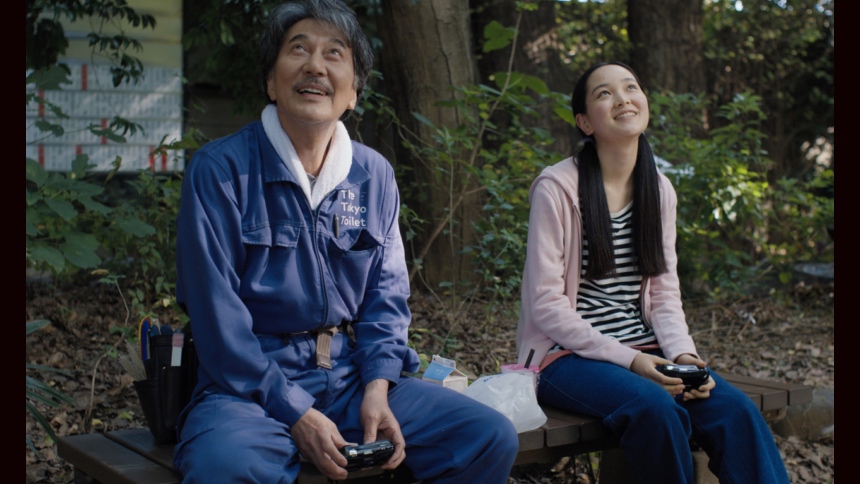Cannes 2023 Review: PERFECT DAYS, Magic Moments
Wim Wenders' new film.

‘How you do anything is how you do everything,’ the saying goes, and it applies profoundly to Hirayama (Koji Yakusho), the spirited hero of Wim Wenders’ very own and very modern Tokyo story.
Every morning, Hirayama, whose name means ‘peaceful mountain,’ awakens to the soft and subtle sounds of the street sweepings of an elderly neighbor, folds up his futon mattress, trims his Chishū Ryū mustache with graceful precision, grabs a can of Boss coffee from his streetside vending machine, pops a meaningful old cassette tape into his van’s tape deck, and begins his day’s work as a traveling public toilet cleaner, in which he tackles dirt of the lowest caliber, as if raking the rock garden of a temple. On his lunch break, he gratefully snaps photographs of “Komorebi”, the uniquely Japanese word that, prior to watching this film, I had understood to mean only the beauty of sunlight peeking through tree leaves.
Although society barely registers his existence, Hirayama registers existence with a full heart and misty eyes that take in his surroundings with a rich perspective full of life and quiet meaning. He enjoys the great songs and books of the past; oftentimes, we simply sit and listen to them through his ears. While he may not have a Townes Van Zandt cassette in his collection (though he also may), it’s not hard to imagine his subtle reactions to the lyrics of ‘To Live is to Fly’: “Days up and down they come, like rain on a conga drum. Forget most, remember some, but don’t turn none away.”
His days bear the capacity for great joy and even perfection, depending on what he encounters, or more importantly, the people with whom he randomly finds himself sharing his time. Not unlike how we’re able to feel vicariously the music of his routine experiences when Hirayama finds himself accidentally introducing a vibrant young woman to the magic of Patti Smith’s "Redondo Beach", we come to understand what Lou Reed may have meant in singing “It's such a perfect day, I’m glad I spent it with you…”
Like a great Ozu work, the minimalist screenplay is chock full of understated lines that act as soft, soulful bullets to the heart, like when his friend the bookkeeper offers an observation on his latest Aya Koda purchase: ‘She uses the same words we do, but when she does it's different’. The poignance is buried in the deceptive simplicity of the exchange, yet she could just as easily be referring to the film's hero, or Wenders himself, or Ozu, or Lou Reed, among a whole world of spirits who recognize themselves in one another.
As Hirayama explains to his runaway niece, who one evening shows up at his doorstep in hopes of coming to better understand her distant uncle: ”The world has many worlds, and not all of them are connected”. Other worlds, like the one in which he and his niece cohabitate, are so connected it makes the struggle of daily existence not just bearable, but beautiful.
While his nieces’ mother, Hirayama’s estranged sister, may never understand why her brother chose to pursue the path of a toilet cleaner, the niece is fully capable of seeing the bittersweet beauty barely contained in his eyes. That they’re able to see each other one random afternoon will be enough to ward her through whatever heaviness she’s currently navigating; that and a good book recommendation from a gay female author of a past century from another side of the earth. Sometimes this is all it takes to not feel alone in the world.
Wim Wenders, whose Palme d’Or winning Wings of Desire helped define a cinematic poetry of observation, returns to the same profound territory in his latest and possibly most spiritually satisfying ode to perspective and the power of connectivity to date. Though it’s a day-in-the-life film, It’s not so much about life as it is the act of feeling, and therefore being alive. With so much existence inundating our senses at every moment, it’s easy to forget our place within the creatures surrounding us: the birds, the fish, the trees, the garbage people, and the poets, breathing it all in while they still can.
While I believed that I had understood the meaning of ‘komorebi’, Wenders provides a definition at the very end of the credits that add a layer that I hadn’t quite appreciated. Komorebi not only refers to light peeking through trees, but a moment in time that can only happen once. In this chaotic world so fraught with noise and imperfect days, it's painfully easy to forget what it's all about. I am beyond grateful to Wenders for the existence of this once-in-a-lifetime reminder.
Perfect Days
Director(s)
- Wim Wenders
Writer(s)
- Wim Wenders
- Takuma Takasaki
Cast
- Koji Yakusho
- Tokio Emoto
- Arisa Nakano







